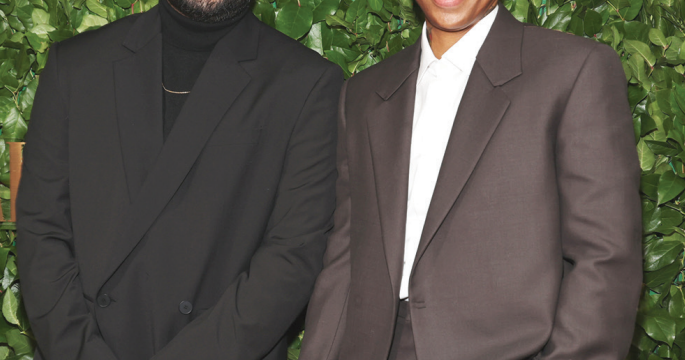LOS ANGELES — At a time when studios are zeroing in on existing intellectual property and tried-and-true storylines to fill up their film and TV slates, Hillman Grad is looking in the opposite direction.
The production company, led by writer-producer-actor Lena Waithe and Chief Executive Rishi Rajani, has put its weight behind projects from emerging and first-time filmmakers including Jingyi Shao (“Chang Can Dunk”), A.V. Rockwell (“A Thousand and One”) and D. Smith (“Kokomo City”) — all of whom released their directorial debuts with Hillman Grad last year to much acclaim.
With belts tightening across Hollywood, Waithe and Rajani share why they see an opportunity for more upcoming filmmakers to get their shot and why a streaming culture that prioritizes a one-size-fitsall, mass appeal approach hurts creatives and viewers.
Q: How has the vision for Hillman Grad changed since you started the company?
Lena Waithe: The business has changed, society has changed, the way we take in content has changed. But for me, what I want to do is really get back to the creative. Sometimes, because of everything that’s going on, we can lose sight of the creative, and it can be about commerce, which I understand. This is a business, things have to make money. There has to be an audience, there has to be supply and demand. But I think there are ways that we can reinvest in the unknown.
Q: Say you’re bringing in a new filmmaker under the Hillman wing. What does that experience look like?
Rishi Rajani: What we were finding is there’s a lot of frustration with the “diversity programs” for finding new talent, because it felt like they were very performative. It was like, bring a writer on to staff on a show for one season, or bring on a filmmaker to shadow on a TV series, and there was no follow-up. There’s no continuing mentorship, there’s no guidance, there’s no interest in their careers beyond that. And so when a filmmaker comes into Hillman Grad, say, for example, they make a short film in the incubator program with Indeed and Rising Voices, it is our goal and aspiration to continue building up their career.
A great example of this is Jingyi Shao. We were really excited about him off of a script and a short film that he had done with HBO. We really liked him as a creator, so we brought him on in the writers’ room for our show “Boomerang.” We gave him the opportunity to direct on our show “Twenties.” We then developed his feature film script with him, workshopped that, sold that to Disney, produced “Chang Can Dunk” with him— I was on set with him in Connecticut for three months. What it was was actually giving real mentorship and real guidance.
Q: You’re building a network of creatives.
Rajani: And if someone’s not quite ready for their first feature film, how do we help them get the experience? We don’t go, “Go out, find the experience, do it and figure it out yourself.” That I heard a lot when I was coming from the studio system. It was like, this is a filmmaker to track, which, to me, is kind of lazy.
Q: How do you pitch projects from newer filmmakers?
Waithe: It is tough. But what we try to do is say, “Hey, this could be the next ‘Get Out.’”
It’s about supply and demand. That’s why the audience is just as important as the artists, because what they support, what they show up for, what they see and where they go, everybody follows the money. Or the eyeball, the viewership, when it comes to streaming. They literally can tell where you are, how long have you watched? Transparency is so helpful, because we want to know: How many people watched my show? Where were they? What are the ages? Who’s my audience?
Q: What do you think the studio system needs to change so it’s more open to new voices?
Rajani: It’s kind of twofold. On one hand, it’s quite frankly getting more decision makers from underrepresented backgrounds into higher ranks of studios and giving people actual greenlight opportunities. We tend to have kind of the same type of person at the top of all of these studios, and they are, quite frankly, straight, white, male POVs and perspectives. And so I think the first step is having the decision makers in those roles be the people that look a little bit like the filmmakers they are trying to champion. You get a diversity of thought and a diversity of opinion that can be very helpful when it’s time to decide what is worth making or not.
Second piece is to understand that, fundamentally, there’s a real opportunity in giving filmmakers smaller budgets and the opportunity to create something. In the studio system, people are spending a lot of money to make movies. And I get it, when it’s $30 million, $40 million, $50 million to make a movie, It’s harder to make a bet on a first-time filmmaker.
You can make really smart business decisions around taking bets on smaller-budget movies, especially as we enter this new kind of scarier poststrike moment for studios. I would encourage a lot of the studios to go, OK, what does a $5 to $7 million movie from an early filmmaker look like, and could that be a big breakout potential success for us?
Q: Any industry wide predictions for 2024?
Rajani: It’s gonna be even harder to make projects. I think the contraction that everyone’s a little bit afraid of is going to occur. We’re already kind of seeing the hesitancy in buyers and the marketplace. The unfortunate thing is we’re also hearing that people are less interested in supporting emerging creators, which feels, unfortunately, very coded language for people from disenfranchised backgrounds. But with every difficult moment in the marketplace, I think we’ll start to see where the opportunities are.





